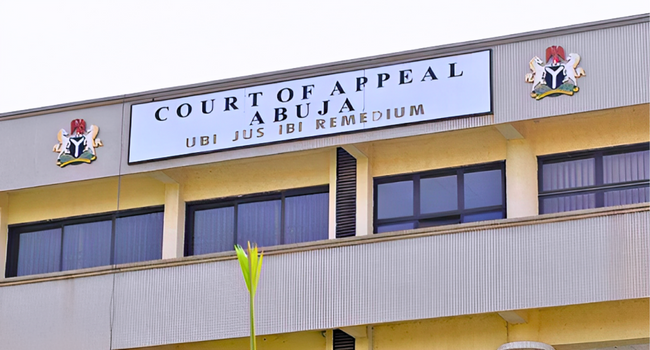The Abuja Court of Appeal has postponed its ruling on an appeal by the Indigenous People of Biafra (IPOB) challenging the Federal Government’s classification of the group as a terrorist organization.
The decision to reserve judgment was made by a three-judge panel headed by Justice Hamma Barka after both the Federal Government and IPOB presented their final arguments through their respective legal representatives.
Representing the Federal Government was Oyilade Koleosho from the Federal Ministry of Justice, while IPOB’s legal team was led by Senior Advocate of Nigeria, Chukwuma-Machukwu Umeh.
IPOB’s detained leader, Nnamdi Kanu, previously sought to join the appeal as an interested party.
IPOB is urging the appellate court to overturn a September 15, 2017, decision by the late Chief Judge of the Federal High Court, Justice Abdul Abdu-Kafarati, which outlawed IPOB’s activities across Nigeria. This original proscription was granted based on an ex-parte motion filed by former Attorney-General of the Federation (AGF), Abubakar Malami.
Justice Kafarati had declared IPOB’s activities illegal, specifically targeting actions in Nigeria’s South-East and South-South regions, and prohibited any involvement in the group’s activities. The judge also mandated that the proscription order be published in the official gazette and in two national newspapers.
In a subsequent ruling on January 22, 2018, the court rejected IPOB’s motion disputing the legitimacy of the proscription order, which IPOB argued was obtained through misrepresentation by the AGF. IPOB claimed the order effectively labeled over 30 million Igbos as terrorists.
Justice Abdu-Kafarati, however, maintained that IPOB posed a threat to national security, thereby upholding the initial ruling.
Justice Abdu-Kafarati dismissed the argument that IPOB, as an unregistered entity in Nigeria, could not be legally challenged by the Federal Government. The court asserted that IPOB’s claim of being registered in over 40 other countries did not exempt it from accountability under Nigerian law if its activities were deemed unlawful within the country.
In its five-point appeal, IPOB argued that Justice Abdu-Kafarati committed a legal error that led to a miscarriage of justice by ruling that the statutory requirement for President Muhammadu Buhari’s approval, as mandated under Section 2(1)(C) of the Terrorism (Prevention) (Amendment) Act, 2013, was fulfilled based solely on a memo issued by the Attorney-General of the Federation on September 15, 2017.
IPOB further contended that the lower court judge neglected to review, consider, or reference the affidavit evidence presented to demonstrate that IPOB is not a violent organization.
“Proper findings of facts built on a meticulous evaluation of Affidavit evidence placed before the Court below, will resolve whether the activities and characters of the Appellant as clearly distinguished vide compelling exhibits placed before the Court, meet the threshold definition of terrorism acts, as contemplated under Section 2 (i) (a) (b) & (c) of the Terrorism Prevention (Amendment) Act, 2013.
“The Appellant’s activities as contested in its written submission before the Trial Court, strongly supported by credible Affidavit evidence falls short of acts of terrorism as contemplated under Section 2 (1) (A) (B) & (C) of the Terrorism (Prevention) (Amendment) Act; this submission was not considered by the Learned Trial Judge.
“The Learned trial Judge justified the granting of the Exparte Order of 20th September 2017, vide finding of facts predicated on issues he formulated suo motu, ostensibly closing his eyes to facts, as well as documents that show that the Appellant is a group of persons holding common political belief largely made up of indigenous people of Igbo extraction and other neighbouring regions merely exercising their constitutional rights to self-determination, within the bounds of relevant international instruments and conventions.
“Affidavit evidence placed before the Trial Court shows in clear terms that the Appellant does not possess any form of arms, or weapons in the exercise of their constitutionally guaranteed rights, or have any history of violence or had engaged in any form of killings; the activities of the Appellant are essentially characterized by moving in groups with cardboards and placards in their hands, singing, blowing whistles and flutes, in agitation for self-determination; these compelling facts supported by credible evidence were not evaluated by the Court below in its finding of facts.
“Activities of the Appellant as demonstrated before the lower court, is in sharp contrast with characters of notorious groups that have even used violence such as FULANI HERDSMEN (which has been declared the 4th most dangerous terrorist organization in the world), and none of these violent group has earned terrorist tag, because the President most probably considered them as possessing or professing protected political beliefs,” IPOB said.
While urging the appellate court to allow the appeal, IPOB’s lawyer, Umeh, SAN, argued that the organization was denied a fair hearing.
Counsel to the Federal Government, Koleosho, who denied the allegation, prayed the appellate court to dismiss the appeal.
After it had listened to both sides, the Appeal Court panel said it would communicate the judgement date to the parties.



